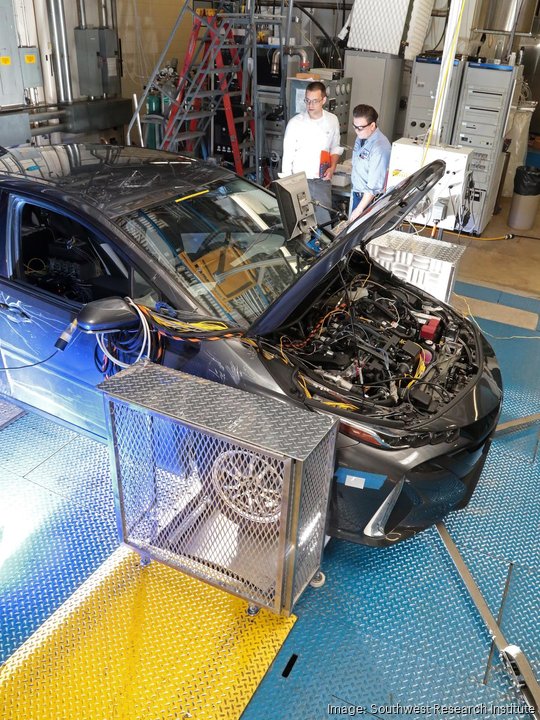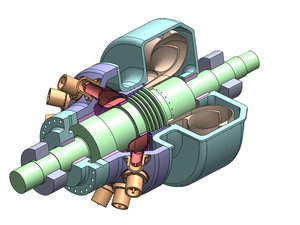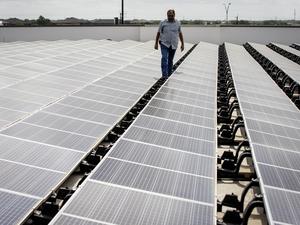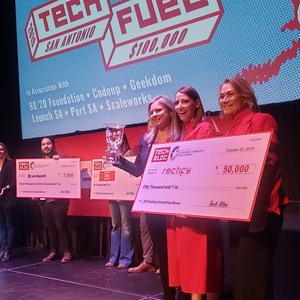
Southwest Research Institute (SwRI) has revealed its latest advancement toward making hydrogen power a viable green energy alternative.
Yesterday, SwRI announced the development of a novel hydrogen compressor touted by the company as having improved efficiency and reliability of hydrogen compression used in the refueling of fuel cell electric vehicles (FCEVs).
SwRI said its linear motor-driven reciprocating compressor (LMRC), designed to compress hydrogen as a fuel source for FCEVs and other hydrogen-powered vehicles is, unlike most hydrogen compressors, hermetically sealed and has a linear motor design that increases its efficiency and reliability.
"To refuel hydrogen vehicles, the gas must be compressed to high pressures first," said SwRI Principal Engineer Eugene 'Buddy' Broerman, the project's lead investigator. "So, we set out to design a more efficient, leak-proof compressor."
A key challenge for hydrogen compression is hydrogen's small particle size, according to SwRI, which increases the potential for leaks as the gas flows through equipment.
Broerman said hydrogen particles' small size cause "inherent material compatibility issues when designing a compressor."
"The particles are so small that they sneak in and alter materials and equipment performance," he said.
Along with its hermetically sealed, airtight compressor, the LMRC features coatings to protect magnets from hydrogen incursion and embrittlement and improved valve designs to minimize leaks. It also utilizes a ceramic piston to minimize heat expansion and lower stress on its seal.
"Typical compressors have a piston and crank mechanism that requires them to make the same motion every time, with every revolution of the motor that's driving it," Broerman said. "The LMRC is linearly actuated, so we can change the linear motion profile to optimize the compression process."
Because the LMRC's linear motor can move the piston in a user-defined motion pattern, the compressor's seals and bearings also experience less friction, negating the need for traditional lubrication.
SwRI said the LMRC can also be used in a range of compression applications to avoid gas leaking into the atmosphere, such as hazardous gas or flare gas recovery applications.
Originally funded by the DOE and cost-shared by ACI Services, work on the LMRC began in 2014, according to Broerman. The LMRC was successfully run for the first time in 2020 and completed continuous operation at design conditions in mid-to-late 2022.
In recent years, hydrogen-related companies have caught the eye of private equity and venture capital firms across the United States, according to a March 29 report from the Clean Air Task Force (CATF).
In 2022 alone, private equity and venture firms spent over $5 billion on hydrogen-related companies, according to CATF.
The U.S. government also has also made strategic investments in hydrogen energy through Congress' passage of the Infrastructure Investment and Jobs Act in 2021, which allocated $8 billion for the DOE to fund four Regional Clean Hydrogen Hubs across the United States.
SwRI has a multidisciplinary team dedicated to hydrogen energy research initiatives to deploy decarbonization technologies across a broad spectrum of industries.
"The goal that is set out from our government is having a low carbon and low carbon dioxide-emitting fuel as an emission," Broerman explained. "We've been designing lots of different technologies for making that a possibility. Ultimately, the goal would be to, if that becomes the fuel of choice, to make it a safe fuel of choice and also make it a low cost of fuel so that it's available to everyone."
SwRI is an independent, nonprofit, applied R&D organization based in San Antonio, with more than 3,000 employees and an annual research volume of nearly $798 million.






